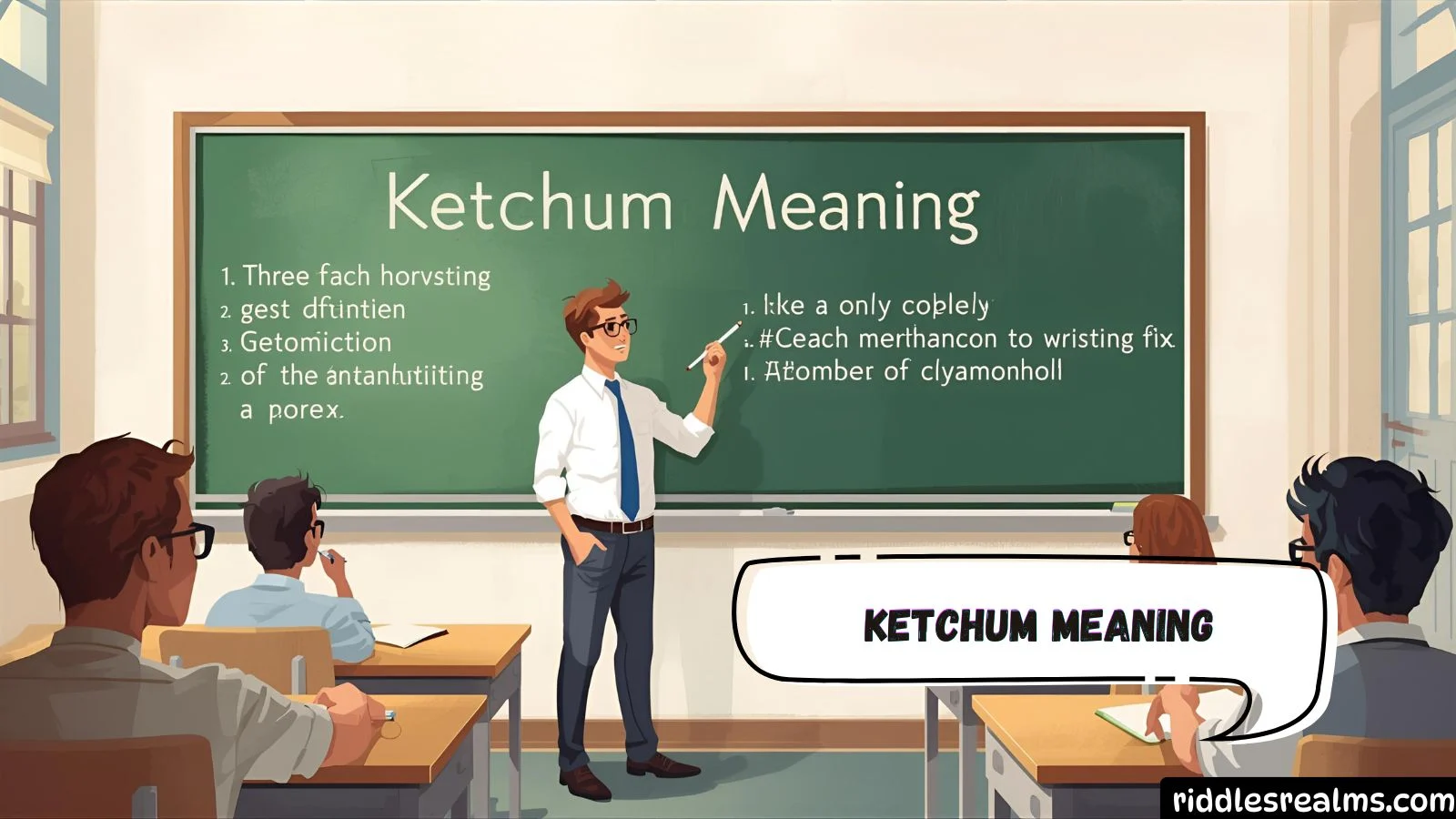The word “Ketchum” carries multiple meanings, from being a surname with deep historical roots to representing famous places in the United States, and even a pop culture reference through the iconic Pokémon character, Ash Ketchum. Understanding the meaning of “Ketchum” requires looking at its etymology, family history, geographical importance, and cultural impact. Ketchum Meaning.
In this article, we will explore:
- The origin and history of the Ketchum surname
- The meaning behind the word “Ketchum”
- Notable people and places named Ketchum
- The role of Ketchum in literature, media, and pop culture
- How the name is used in modern society
By the end, you’ll have a complete understanding of what “Ketchum” means and why it continues to be a word of historical, cultural, and personal interest.
The Etymology and Origin of Ketchum
The surname Ketchum has its origins in England and early America. It is believed to be an Anglo-Saxon name, derived from old English place names and occupations.
- The root of “Ketchum” is linked to catching or hunting, referring to a person who hunted animals or managed land for hunting.
- Another interpretation suggests it comes from a geographical place-name, meaning “settlement by the bend of a river.”
- The spelling variations across centuries include: Catcham, Ketcham, Ketchum, and Ketchem.
Table: Variations of the Surname Ketchum
| Variation | Origin/Usage | Notes |
| Catcham | Early English | Original spelling in Old England |
| Ketcham | Colonial America | Found in New York & New England |
| Ketchum | Modern form | Most common in the U.S. |
| Ketchem | Regional spelling | Rare, but exists in family lines |
Read More: Shopping Centre Riddles 2025-2026 That Will Brighten Your Day
Ketchum as a Surname
The Ketchum family name became well known in early American history, especially in New England and later spreading westward. Many Ketchum families can trace their roots back to the 1600s.
- Early Settlers: Edward Ketcham and his descendants settled in Massachusetts and New York during the 17th century.
- Revolutionary War Era: Members of the Ketchum family participated in the American Revolution.
- Modern Families: Today, thousands of people across the U.S., Canada, and the U.K. carry the last name Ketchum.
Table: Geographic Distribution of Ketchum Surname
| Country | Population with surname | Rank in surname list |
| United States | ~15,000 | Common |
| Canada | ~1,200 | Less common |
| England | ~600 | Rare |
| Australia | ~300 | Rare |
Ketchum in American History
The Ketchum surname appears in several chapters of U.S. history.
- Civil War: William Ketchum, an inventor, patented the “Ketchum Grenade,” used during the war.
- Political Influence: Several politicians, businessmen, and community leaders carried the Ketchum surname.
- Western Expansion: Families with the name moved westward, especially to Idaho, where the city of Ketchum would later emerge.
Places Named Ketchum
One of the most famous uses of “Ketchum” is as a place name. Several towns and cities in the U.S. bear the name, most notably Ketchum, Idaho.
Ketchum, Idaho
- Founded during the silver mining boom in the 1880s.
- Located near Sun Valley, a world-famous ski resort.
- Known for being the home of Ernest Hemingway, where he spent his final years.
- Today, Ketchum is a hub for outdoor sports, tourism, and art.
Ketchum, Oklahoma
- A smaller town named after early settlers.
- Known for its tight-knit community and rural charm.
Ketchum in Pop Culture: Ash Ketchum
For many, the first thought when hearing “Ketchum” is Ash Ketchum, the protagonist of the Pokémon series.
- Ash’s Japanese name is Satoshi, but in English, “Ketchum” was chosen as a play on the phrase “Catch ’em” — referencing Pokémon’s slogan: “Gotta catch ’em all!”
- Ash Ketchum represents determination, adventure, and the dream of becoming a Pokémon Master.
- Over decades, Ash has become one of the most recognizable animated characters worldwide.
Ketchum in Literature and Media
The name Ketchum has appeared in novels, films, and television.
- Ernest Hemingway’s Connection: His residence in Ketchum, Idaho, has made the town an iconic literary site.
- Jack Ketchum: The pen name of Dallas Mayr, an American horror author known for his chilling novels like The Girl Next Door.
- Movies and Pop References: The word “Ketchum” often pops up in American storytelling, symbolizing small-town life or adventure.
The Symbolism and Meaning of Ketchum
The meaning of Ketchum goes beyond history. It carries symbolic weight in different contexts:
- Surname Meaning: Refers to people tied to hunting, land, or place-based roots.
- Place Name: Represents American expansion, settlement, and community identity.
- Pop Culture Meaning: “Catch them” — symbolic of adventure, exploration, and persistence.
- Modern Symbolism: Today, Ketchum can stand for family legacy, storytelling, and cultural identity.
Notable People Named Ketchum
Many individuals with the last name Ketchum have made an impact in different fields.
- William Ketchum (Civil War inventor) – Designed the Ketchum Grenade.
- Jack Ketchum (author) – Famous horror writer.
- Hank Ketcham – Cartoonist, creator of Dennis the Menace.
- Ash Ketchum (fictional) – Global pop icon from Pokémon.
Ketchum in Modern Society
Today, “Ketchum” exists as:
- A surname carried by thousands of families.
- A town name known for culture, skiing, and Hemingway.
- A brand identity in entertainment, storytelling, and sports.
- A digital-era symbol, thanks to Ash Ketchum’s international fame.
Businesses, schools, and organizations also carry the name “Ketchum,” keeping its legacy alive in communities worldwide.
Conclusion
The word Ketchum is more than just a name. It is a bridge between history, geography, and culture. From its Anglo-Saxon surname roots to its presence in American towns, and from Hemingway’s Idaho retreat to Pokémon’s Ash Ketchum, the meaning of Ketchum has evolved into a symbol of heritage, adventure, and identity.
Whether you encounter it as a surname, a place name, or a pop culture reference, “Ketchum” carries with it a sense of history, storytelling, and exploration. Its layered meaning shows how one word can connect generations, geographies, and even global audiences.


